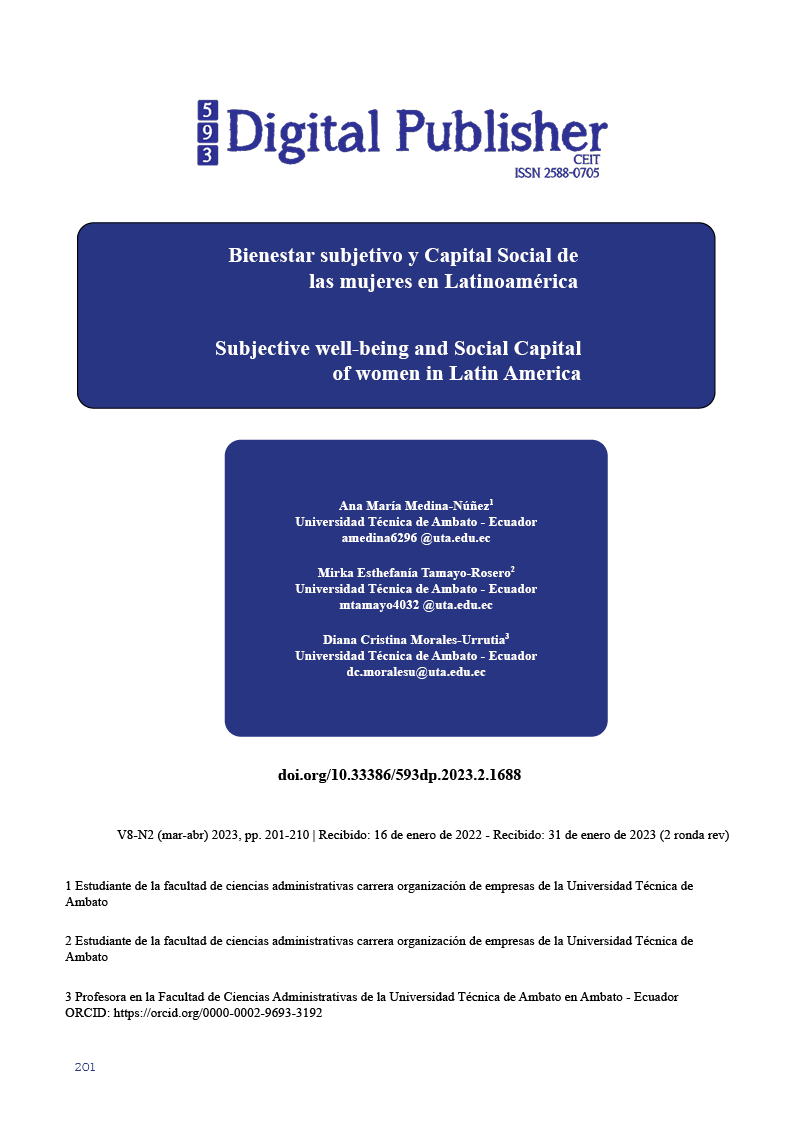Subjective well-being and Social Capital of women in Latin America
Main Article Content
Abstract
The objective of this research is to analyze the subjective well-being and social capital of women in Latin America, this study is specifically based on countries such as Colombia and Ecuador. Theoretically, the study is approached from the expectation of several authors of the positive life in this case of women, the validation of their emotions, the pleasure with the life they lead, based on their rights. Within social capital, the inclusion of women is studied for various conditions; of poverty, violence and discrimination, in search of female growth and autonomy. Finally, the general situation of women in Latin America is described. Methodologically, a quantitative approach is used through descriptive and exploratory research. In general, the results show that there are marked differences in the case of women in terms of subjective well-being and social capital in the societies analyzed.
Downloads
Article Details

This work is licensed under a Creative Commons Attribution-NonCommercial-ShareAlike 4.0 International License.
1. Derechos de autor
Las obras que se publican en 593 Digital Publisher CEIT están sujetas a los siguientes términos:
1.1. 593 Digital Publisher CEIT, conserva los derechos patrimoniales (copyright) de las obras publicadas, favorece y permite la reutilización de las mismas bajo la licencia Licencia Creative Commons 4.0 de Reconocimiento-NoComercial-CompartirIgual 4.0, por lo cual se pueden copiar, usar, difundir, transmitir y exponer públicamente, siempre que:
1.1.a. Se cite la autoría y fuente original de su publicación (revista, editorial, URL).
1.1.b. No se usen para fines comerciales u onerosos.
1.1.c. Se mencione la existencia y especificaciones de esta licencia de uso.
References
Abril, E., Cubillas, M. J., & Domínguez, S. E. (2022). Factores Socioeconómicos Asociados a la Felicidad y Bienestar en Estudiantes Universitarios del Noroeste de México. Know and Share Psychology, 3(3), 9–25. https://doi.org/10.25115/kasp.v3i3.6878
Aguilar Dornelles, M. A., Miseres, V., & Montero, C. (2021). Presentación. Sufragio femenino en América Latina: alianzas nacionalistas y políticas transnacionales. Meridional. Revista Chilena de Estudios Latinoamericanos, 17, 11. https://doi.org/10.5354/0719-4862.2021.64867
Antonio, A., & Cinthia, B. (2019). Capital social e o acesso à proteção social. Administração Pública e Gestão Social, 11(1), 79–91. https://doi.org/10.21118/apgs.v11i1.1570
Avolio, B., & Di Laura, G. (2017). Progreso y evolución de la inserción de la mujer en actividades productivas y empresariales en América del Sur. Cepal Review, 2017(122), 35–62. https://doi.org/10.18356/e8a70e3a-es
Bayón, M. C., & Saraví, G. A. (2019). Desigualdades: subjetividad, otredad y convivencia social en Latinoamérica. Desacatos. Revista de Ciencias Sociales, 59, 8. https://doi.org/10.29340/59.2046
Bernaldez, J., Magallanes, M., & Juarez, R. (2020). Problemática educativa en américa latina: Una mirada socioeconómica. Desarrollo Económico, Social y Empresarial En Iberoamérica, 12(2), 199–222. https://www.eumed.net/actas/20/desarrollo-empresarial/15-problematica-educativa-en-america-latina-una-mirada-socioeconomica.pdf
Cabezas, P. (2020). mujeres en la. https://repositorio.uasb.edu.ec/bitstream/10644/7784/1/T3367-Cabezas-La inclusion.pdf
CEPAL. (1999). “ A n á l i s i s Comparativo de l a S i t u a c i ó n de l a s Mujeres e n t r e l o s años 199 0 y 199 8.”
CEPAL. (2017). Estrategia de Montevideo para la Implementación de la Agenda Regional de Género en el Marco del Desarrollo Sostenible hacia 2030. Décimotercera Conferencia Regional sobre la Mujer de América Latina y el Caribe. 1–41. http://hdl.handle.net/11362/41011
Colombia, G. de. (2021). CPD ONU-Mujeres 2021-2024 firmado.pdf. http://hdl.handle.net/11362/41011
Corzo, M., & Galeano, E. G. (2020). Las mujeres ante la educación superior en Colombia: una aproximación general. CAF. Foro Por La Vida, 3(10), 83–104. https://repository.ucatolica.edu.co/handle/10983/25216
De Jesús, V., Carro, J., Gamiño, R., & Scholar, G. (2018). Familias De Militares En México. Bienestar Objetivo Y Bienestar Subjetivo: Bases Para Un Debate *. 10, 87–104. https://doi.org/10.17151/rlef.2018.10.2.6
Escobar, M., & Manrique, J. O. (2022). Hoja de ruta : Inclusión financiera con equidad de género para las mujeres Tabla de contenido.
García, A., & Malvaceda, E. (2022). Percepción de la calidad de vida urbana en residentes del Área Metropolitana de Monterrey, México: su importancia psicoeducativa. Propósitos y Representaciones, 10(1). https://doi.org/10.20511/pyr2022.v10n1.1452
Guachamin, E. (2010). Enfoque de género en la asignación de créditos en el sistema financiero ecuatoriano. 44. https://repositorio.flacsoandes.edu.ec/handle/10469/2403
Mantilla, L. M., Galarza, J. C., & Zamora, R. A. (2017). La Inserción De La Mujer En La Educación Superior Ecuatoriana : Caso Universidad Técnica De Ambato . Revista Latinoamericana de Estudios Educativos, 13(2), 12–29. https://doi.org/10.17151/rlee.2017.13.2.2
Marchionni, M., Gasparini, L., & Edo, M. (2022). Género en América Latina. In S. Albiez-Wieck, S. Hensel, H. Meding, & K. Schembs (Eds.), Género en América Latina. Iberoamericana Vervuert. https://doi.org/10.31819/9783968691992
Moreno, Á., & Milena, D. (2020). Trabajo Y Brechas De Género En Colombia Tras Un Año De Pandemia. 1–31.
Nagao, D. F., Silva, C., & Geovânia, S. (2022). a Economia Social E Solidária E O Debate Dos Conceitos Maximalista E Minimalista. Cooperativismo e Economía Social, 43(43), 37–56. https://doi.org/10.35869/ces.v0i43.3802
Navarro, J. C., Giménez, V. M., & Ayvar, F. J. (2016). Generación de bienestar social en México: un estudio DEA a partir del IDH. Economía Sociedad y Territorio, 52, 591. https://doi.org/10.22136/est0522016409
Niño, T., & Cortés, M. (2018). Comunicación Estratégica y Responsabilidad Social Empresarial, escenarios y potencialidades en creación de capital social. Prisma Social: Revista de Investigación Social, ISSN-e 1989-3469, No. 22, 2018 (Ejemplar Dedicado a: La Investigación En La Comunicación Organizacional a Debate), Págs. 127-158, 22, 127–158. https://dialnet.unirioja.es/servlet/articulo?codigo=6562963
Norte, F. (n.d.). DEMANDA DEL MERCADO. 13,14. https://www.r4v.info/sites/default/files/2021-07/ONU_Mujeres_HIAS_Demanda_mercado_laboral_mujeres.pdf
Razo, A. M., Díaz, R., & López, M. P. (2018). Construcción de las representaciones sociales de la calidad de Vida en diferentes etapas de la vida adulta. Cuarderno Venezolano de Sociología, 27(1315), 149–167. https://www.redalyc.org/journal/122/12260455015/12260455015.pdf%0Afile:///C:/Users/Nama/Desktop/PSICO CUATRI COVID/LIBROS/art 1.pdf
Ruiz, C. B. (2021). Mujeres en la educación: desigualdades sociales más allá del género. Análisis, 53(98). https://doi.org/10.15332/21459169.6237
Sánchez, M. (2011). Calidad de vida de las mujeres colombianas. 158. http://www.bdigital.unal.edu.co/3577/
Vega Fernando. (2022). DILEMAS CONSTITUCIONALES SOBRE EL BIENESTAR Y BUEN VIVIR EN COLOMBIA. Red de Repositorios Latinoamericanos, 4(1), 88–100.




